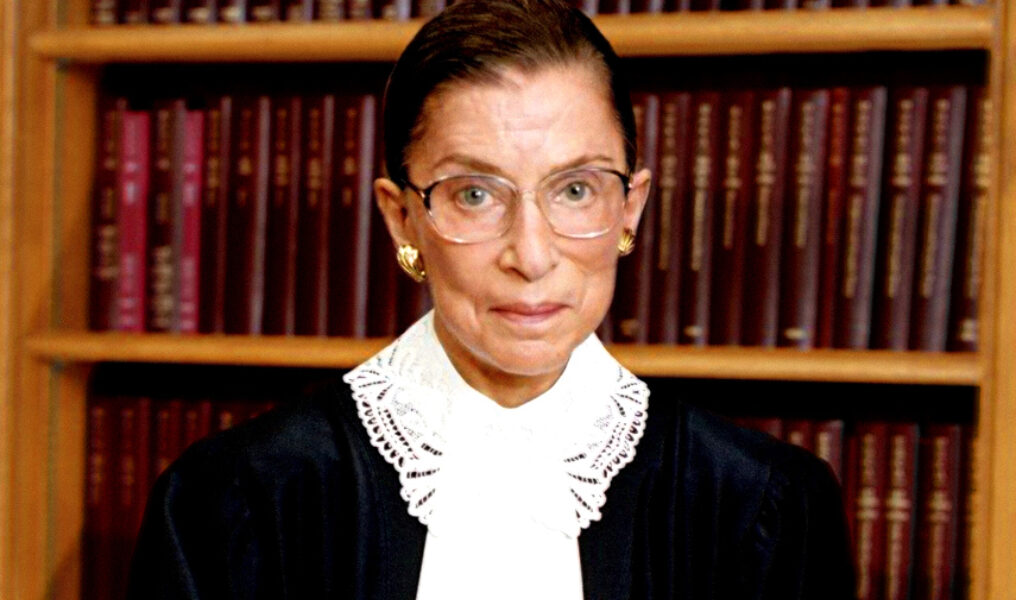Editor's note: This interview was conducted before the nomination of Amy Coney Barrett
As staff attorney for the American Civil Liberties Union of Michigan's LGBT Project, Jay Kaplan often unpacks legal decisions in a way that helps readers — and writers — understand. With the recent passing of Supreme Court Justice Ruth Bader Ginsburg, we also asked that Kaplan share his own reflections of her tenure on the Court and what it meant to him personally.
"Devastating"
On Sept. 18, Kaplan had just returned home from Rosh Hashanah dinner with his mother to celebrate the Jewish New Year. He was out for a walk when a friend texted him with the news that Justice Ginsburg had died.
"It was devastating," Kaplan said. "Just an incredible loss to the Court, to our country and, of course, what immediately also came up was the fear — what's going to happen next? Because I had read before that Senate Leader Mitch McConnell had told donors at several fundraisers that, 'Should Justice Ginsburg drop dead before the election, even if it's a week before the election, we'll get somebody else on that court, I promise you.'"
Kaplan said that although her support of LGBTQ rights might have been less obvious because she did not author any of the movement's seminal decisions, "she always was with the majority from the very beginning." He briefly enumerated those contributions.

Jay Kaplan. BTL Photo: Andrew Potter.
In 1996, Justice Ginsburg sided with the majority in Romer v. Evans, the first case in which the Court declared that discrimination based on sexual orientation violated constitutionally protected rights. Next, when the Court reversed a state's sodomy law in 2003's Lawrence v. Texas case, by extension, that invalidated all the remaining sodomy laws on the books in 13 other states. Ginsburg sided with the majority in that decision, too, which finally made same-sex sexual activity legal in every U.S. state and territory.
"And then, of course, the next decision was striking down part of the Defense of Marriage Act, that said that the federal government would not recognize legal marriages between same-sex couples that were granted in the various states that were permitting couples to get married," Kaplan said. He recalled her famous criticism of the federal government for treating same-sex unions as "skim milk marriages" — somehow inferior or weakened because they weren't granted the same recognition or protections as heterosexual marriages.
Ginsburg sided with the majority in the marriage equality case and the Masterpiece Cakeshop v. Colorado Civil Rights Commission case as well. Kaplan pointed out that although most people focus on the issue with the baker — the civil rights judgments against the baker were reversed — what the majority also ruled was that a business open to the public must serve the entire public. Further, the government has a compelling interest in enforcing civil rights laws that prohibit discrimination.
Finally, most recently, was the Bostock v. Clayton County case. That decision ruled that discrimination against employees because of their sexual orientation or transgender status amounts to sex discrimination.
Remembering 'Bostock'
And it was during oral arguments for the Bostock case that Kaplan witnessed Ginsburg in action, as he accompanied Aimee Stephens, the Michigan funeral director who was fired for being transgender.
"It's very dramatic how the justices come out there," Kaplan explained. "They each have like a little entrance area right where they go up to their bench and everybody rises and you see them sitting there — and there she was. She looked very frail; this was less than a year ago. But when she spoke — and she did speak a lot, she had a lot of questions to ask — her voice was very strong, and she was sharp as a tack. And she really made it clear that she knew all about Title VII law and how this works and what this means in regards to discrimination 'because of sex.'"
He said that it was very "telling" that after the argument he got calls from friends about family asking how it went and, immediately after, people asked about Ginsburg.
"'How was Justice Ginsburg?' 'How'd she look?' 'Is she doing OK?' It was just wonderful to see that not only do people certainly admire her but also they really cared about her well-being and her welfare and wanted her to be on this Court and really felt that she was such an incredible asset in her contributions to the Court," he said.
Kaplan called Ginsburg "a living hero," along with Congressman John Lewis, who the country lost this year.
ACLU Legend
Before she was appointed to the federal court, Ginsburg worked for the ACLU, and it was there that she established the Women's Law Project. Kaplan described the Zoom videoconference call that occurred the Monday after her death, attended by the full staff of the civil rights organization: 1,000 employees strong from across the nation. He said there were many tributes.
"One of the things that I was struck by, [and] I believe they might have been quoting her, they were saying something to the effect that even when you know you might not be able to win, you have to still lead," Kaplan said. "And you have to do this work to give hope to other people. So inspiring. Her life was so inspiring. And her commitment to justice and fairness."
Among other things, Kaplan is concerned about a case that will be heard this fall, Fulton v. City of Philadelphia. That case will decide whether faith-based foster agencies have the right to receive a government contract if they discriminate against LGBTQ people, citing their religious beliefs.
"There's potential for a lot of cases and progress that we've made on many issues but also including many LGBT issues that look pretty precarious right now," Kaplan said.
Vote, Vote, Vote
Kaplan doesn't believe the Senate Democrats have the power to reject a Supreme Court nominee hostile to civil rights, as the current president and Senate Republicans seem bent on doing. But there is recourse.
"The only thing that we can do, if we want to change this whole trajectory, is to participate in this election at a rate and at a percentage like never before," Kaplan stressed. "That's what makes this election so important."
Residents of Michigan may soon have to look more to the state courts for relief, according to Kaplan. With Republicans holding a 4-3 majority on the Michigan Supreme Court, Democrats have a real chance for the first time in two decades to secure a progressive majority by electing Elizabeth Welch and reelecting Chief Justice Bridget Mary McCormack, the two candidates nominated by the Michigan Democratic Party.
"Once again, all paths lead to this election and the importance of everybody participating," Kaplan said. And that includes the LGBTQ community, now more than ever.
"There's part of our community that's complacent and not very well-informed," Kaplan said. "And the fact that we have a fifth of the [LGBTQ community] who aren't even registered to vote, that's of concern. There's so much at stake right now and certainly, the courts are among them."
Putting It in Perspective
Despite Ginsburg's final wish, in all likelihood, she will be replaced before the election, and by a conservative justice.
"I'm always one that's been kind of able to put things a little bit in perspective and focus on the work, but it's been difficult," Kaplan said. "It's been very difficult…when you care so much [about] what's happening in this world and you see so much that goes against your ethics and values about what you think is right and what you think is fair.
"But I find comfort in the fact that a lot of other people do share those same values," he continued. "And just like Justice Ginsburg said, even when you know you might not be able to win, on everything you might want to accomplish, you still have to lead. You still have to do things that give hope to other people."
Finally, Kaplan summed up the sentiments of many people who have felt Ginsburg's "comforting and reassuring presence" on the Court over the past four years under this president.
"Everybody feels a little untethered as a result of her death."










